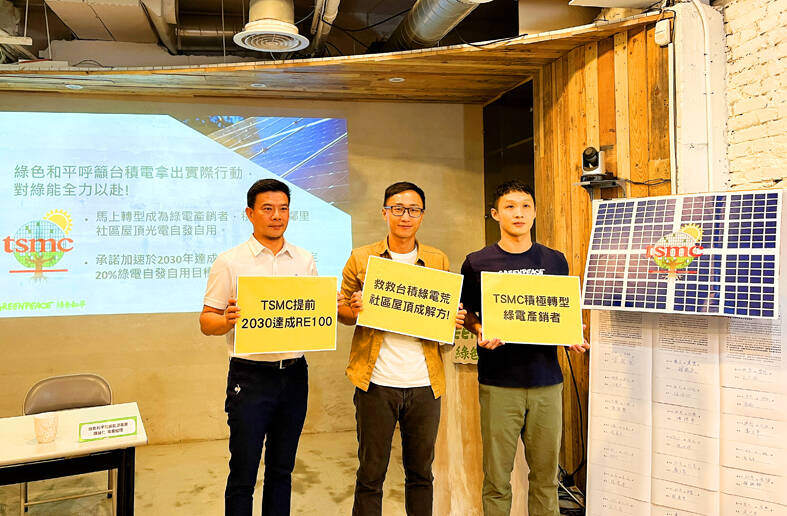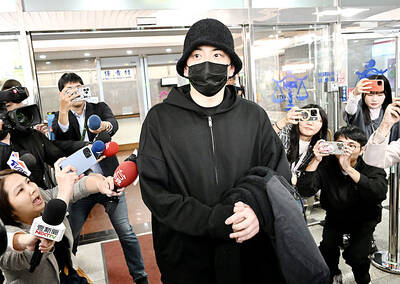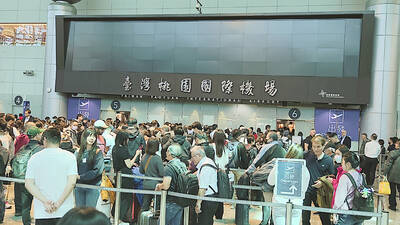Greenpeace yesterday urged semiconductor companies to further embrace solar energy, citing a survey that found nearly half of respondents living near where Taiwan Semiconductor Manufacturing Co (TSMC) has or plans to establish operations would be willing to lease their roofs for solar panels.
Forty-six percent of respondents in Tainan, Kaohsiung, and Hsinchu city and county who said they would be willing to rent out roof space for solar panels, Greenpeace Climate and Energy Project manager Chen Yung-jen (陳詠仁) said, citing a survey conducted by the charity in May.
Nearly 70 percent of respondents said that chipmakers should do more to increase the amount of solar energy produced, Chen added.

Photo: Chen Chia-yi, Taipei Times
Twenty-five village leaders from administrative regions around the Central Taiwan Science Park (中部科學園區) — where some TSMC fabs are based — said that they would be willing to lead an effort to persuade the semiconductor firm to help fund the installation of rooftop solar equipment in the area, he said.
The combined area of rooftops available for solar panels exceeds 900 hectares, about 444 times the size of Taipei Arena, Greenpeace said.
If used, they provide solar panel capacity of up to 900 megawatts, generating about 1,000 gigawatt-hours of renewable electricity annually, he said.
Chen said that if TSMC fully utilizes this capacity, its renewable energy use could increase to 15 percent of its total, up from the 10.4 percent reported in the chipmaker’s sustainability report last year.
Greenpeace has launched an online petition to ask village leaders across Taiwan to persuade residents to lease their unused rooftops for TSMC’s solar equipment installation, he said.
The petition data would be provided to TSMC for reference, the Greenpeace Web site says.
“The idea is not to single out TSMC, but to urge all semiconductor firms to increase solar energy use. Hopefully, TSMC, as the most well-known company, can act as the industry leader,” Chen said.
Taiwan Photovoltaic Industry Association executive director Chen Kun-hong (陳坤宏) said that numerous photovoltaic firms have already begun collaborating with local administrative units to develop community rooftop solar projects.
John Yang (楊仲傑), village warden of Tanyang in Taichung, said that residents strongly support Taiwan’s renewable energy development and efforts to provide renewable energy to TSMC.
However, he said that some residents would consider factors such as risk, construction quality and maintenance when deciding whether to allow the installation of solar panels on their rooftops.
Yang also said that if TSMC can hold face-to-face meetings to discuss these matters, it would reassure many Tanyang residents, and would aligns with TSMC’s social obligations as a major corporation.
TSMC joined the RE100 initiative in 2020, committing to achieve 100 percent renewable energy usage by 2050.

The National Immigration Agency (NIA) said yesterday that it will revoke the dependent-based residence permit of a Chinese social media influencer who reportedly “openly advocated for [China’s] unification through military force” with Taiwan. The Chinese national, identified by her surname Liu (劉), will have her residence permit revoked in accordance with Article 14 of the “Measures for the permission of family- based residence, long-term residence and settlement of people from the Mainland Area in the Taiwan Area,” the NIA said in a news release. The agency explained it received reports that Liu made “unifying Taiwan through military force” statements on her online

A magnitude 5.7 earthquake struck off Taitung County at 1:09pm today, the Central Weather Administration (CWA) said. The hypocenter was 53km northeast of Taitung County Hall at a depth of 12.5km, CWA data showed. The intensity of the quake, which gauges the actual effect of a seismic event, measured 4 in Taitung County and Hualien County on Taiwan's seven-tier intensity scale, the data showed. The quake had an intensity of 3 in Nantou County, Chiayi County, Yunlin County, Kaohsiung and Tainan, the data showed. There were no immediate reports of damage following the quake.

Actor Darren Wang (王大陸) is to begin his one-year alternative military service tomorrow amid ongoing legal issues, the Ministry of the Interior said yesterday. Wang, who last month was released on bail of NT$150,000 (US$4,561) as he faces charges of allegedly attempting to evade military service and forging documents, has been ordered to report to Taipei Railway Station at 9am tomorrow, the Alternative Military Service Training and Management Center said. The 33-year-old would join about 1,300 other conscripts in the 263rd cohort of general alternative service for training at the Chenggong Ling camp in Taichung, a center official told reporters. Wang would first

MINOR DISRUPTION: The outage affected check-in and security screening, while passport control was done manually and runway operations continued unaffected The main departure hall and other parts of Terminal 2 at Taiwan Taoyuan International Airport lost power on Tuesday, causing confusion among passengers before electricity was fully restored more than an hour later. The outage, the cause of which is still being investigated, began at about midday and affected parts of Terminal 2, including the check-in gates, the security screening area and some duty-free shops. Parts of the terminal immediately activated backup power sources, while others remained dark until power was restored in some of the affected areas starting at 12:23pm. Power was fully restored at 1:13pm. Taoyuan International Airport Corp said in a